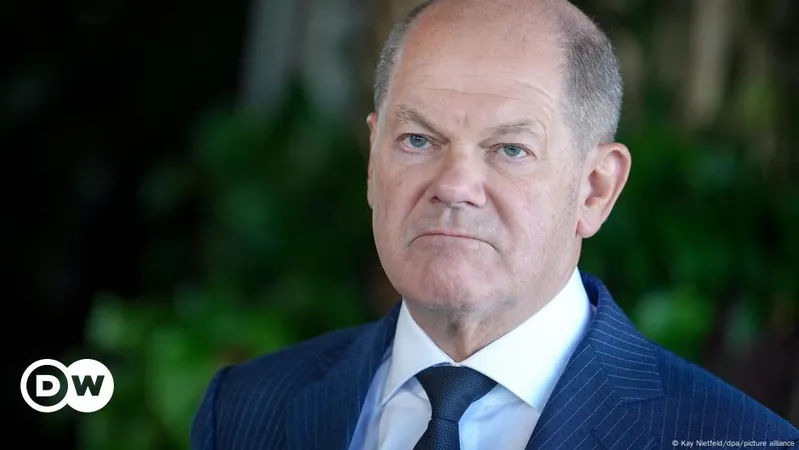
G20 Summit: Scholz Expresses Disappointment Over Final Communique’s Stance on Russia and Middle East
2024-11-20
Author: Wai
German Chancellor Olaf Scholz has expressed his frustration with the final communique produced at the recent Group of 20 (G20) summit held in Rio de Janeiro, Brazil. In a pointed critique, he lamented that the G20 failed to explicitly hold Russia accountable for its ongoing aggression in Ukraine. 'It is too little when the G20 cannot find the words to make it clear Russia is responsible for the war in Ukraine. It's not what I would have liked,' he stated.
As the summit marked a somber milestone—1,000 days since the onset of the invasion—Scholz directed his ire at Russian President Vladimir Putin. 'These days have been marred by immense suffering due to his megalomania and expansionist violence,' Scholz remarked.
French President Emmanuel Macron joined the chorus, urging Putin to 'listen to reason.' He characterized Russia as a destabilizing force in global politics, emphasizing its responsibilities as a permanent member of the United Nations Security Council. In a bilateral meeting with Chinese President Xi Jinping, Macron also stressed the need for Xi to leverage his influence to encourage Russia towards de-escalation, underscoring the importance of addressing North Korea's recent support for Russia's invasion.
Scholz defended Germany's decision to withhold the transfer of longer-range Taurus missiles to Ukraine, asserting that it was a prudent choice to avoid deeper involvement in the conflict. 'Germany remains Ukraine's largest individual supporter in Europe, but we must act with caution,' he explained, stressing that any military action that could entangle German troops in operational decisions inside Russia was not a viable option.
The communique also addressed the escalating conflict in the Middle East, which has drawn significant concern from the international community. While Scholz stated he appreciated the call for a cease-fire in Gaza, he criticized the document for not affirmatively addressing Israel's right to defend itself against threats from Hamas, Hezbollah, and Iran. 'I very much regret that there was no consensus. It would have been beneficial for the situation had we acknowledged the brutal terrorist attack on Israel that sparked this violence,' he remarked.
The G20 summit also included discussions on pressing global issues, such as climate change and energy security. The leaders reaffirmed their commitment to the Paris Agreement, aiming to limit global warming to 1.5 degrees Celsius, and called for significant increases in climate financing. President Joe Biden concluded the summit with announcements of new substantial pledges aimed at climate and development efforts.
Overall, Scholz noted that the geopolitical tensions among nations are manifesting in G20 deliberations, saying, 'The wind blowing in international relations is getting harsher.' The outcomes of the summit highlight the complex and urgent issues facing global leaders, from the war in Ukraine to the ongoing violence in the Middle East, and the crucial necessity for collective action in the face of climate change.



 Brasil (PT)
Brasil (PT)
 Canada (EN)
Canada (EN)
 Chile (ES)
Chile (ES)
 España (ES)
España (ES)
 France (FR)
France (FR)
 Hong Kong (EN)
Hong Kong (EN)
 Italia (IT)
Italia (IT)
 日本 (JA)
日本 (JA)
 Magyarország (HU)
Magyarország (HU)
 Norge (NO)
Norge (NO)
 Polska (PL)
Polska (PL)
 Schweiz (DE)
Schweiz (DE)
 Singapore (EN)
Singapore (EN)
 Sverige (SV)
Sverige (SV)
 Suomi (FI)
Suomi (FI)
 Türkiye (TR)
Türkiye (TR)